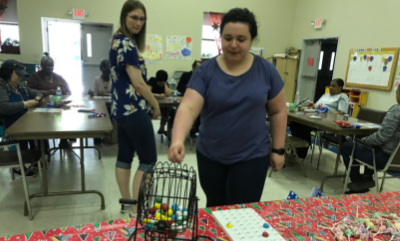“Never underestimate the value of a small project in advancing a larger vision of how to shape the world”.
Public Health concern: Elder isolation. Community Partner Organization: Boston Public Housing Authority, Barkley Housing Development.
Activist Bucks
Knowing how to create a healthier world is not enough; that knowledge has to be turned into action. The Activist Lab is proud to provide a micro-grant program called Activist Bucks to support student projects that create change through action. Students Sarah Brewer and Sabrina Zerzouri teamed up to address elder isolation at the Barkley Housing Development. Both students entered BUSPH interested in the health of older adults. Specifically, Sarah has a long-standing interest in aging and end-of-life care, and Sabrina has significant experience with chronic disease care, geriatric caregiving, and community health programming. Throughout their core courses, their interest in elder social engagement increased and so they were drawn to strategies that would engage elders to reduce their isolation and promote multigenerational connections, especially in a cultural and political climate where these connections are often not adequately fostered. They also knew they wanted to work with communities in the areas surrounding the Boston University Medical Campus.
What was your goal with this project?
We heard about the Activist Bucks program towards the end of our first semester and reached out to Dean Cox and Dr. Fidler, who generously invited us to a Boston Housing Authority meeting. At that meeting, we connected with community leaders and began to formulate a program for Barkley Housing Development, near the BU Medical Campus. The goal of our project became twofold. First, we wanted to reduce elder isolation among Barkley residents, by providing an opportunity for residents to engage with each other. Second, we wanted to cultivate connections between residents and MPH students, to build a relationship that could serve as a foundation for future public health work with this community. Together with Activist Lab staff, community leaders at Barkley, and student volunteers, we have hosted one event per month for senior residents of Barkley. Thus far, our events have centered on bingo, which has proven very popular with the senior residents and younger volunteers alike. In addition, we plan to host a “Senior Prom” event in August.
What have you learned from the folks over at Barkley?
Sabrina: I have learned that health is about a lot more than just exercise, a well-balanced diet, and access to care. Our society often overlooks the importance of social health. We have seen how, in the small community of Barkley, it is relatively easy to implement non-traditional public health tactics to address this overlooked component of health for the elder population.
Sarah: To add to that, I have learned that while we can’t change health overnight, we can combine our resources to catalyze a community dynamic which supports a public health goal. In our experience implementing this project at Barkley, the requisite resources were already within reach: the space, the community interest, and the funding. It was just a matter of pulling those three factors together to promote elder engagement. Of course, the most important factor was the community interest. We attended community meetings and got to know our neighbors at Barkley a lot better. They told us about their concerns with elder isolation in their own community and helped brainstorm activities. Building those connections really shaped this project, and changed how I understand public health practice.
How has being a part of the Activist Bucks program impacted your experience at BUSPH?
Through this project, we have received tremendous assistance from community members and faculty, including Dean Cox, Dr. Anne Fidler, and Marylyn Creer, a community leader, and recent MPH graduate. We began this work with a very simple idea, but through input and meetings with various stakeholders, we were able to create a concrete plan with more confidence that our program would be popular with our target population. This guidance proved crucial to our program’s success.
Do you have any advice for other students interested in Activist Bucks?
One piece of advice we have for students is to never underestimate the value of a small project in advancing a larger vision of how we, as future public health practitioners, want to shape the world. Although the scope of our project is limited, we have seen how something as simple as bingo has brought people together, and our experience as public health students has been enriched by this project. The opportunity to engage with a community and learn from practice-based work through the Activist Bucks grant has been and continues to be truly invaluable. And finally, if you are interested in joining us, email us. We are always looking for volunteers!